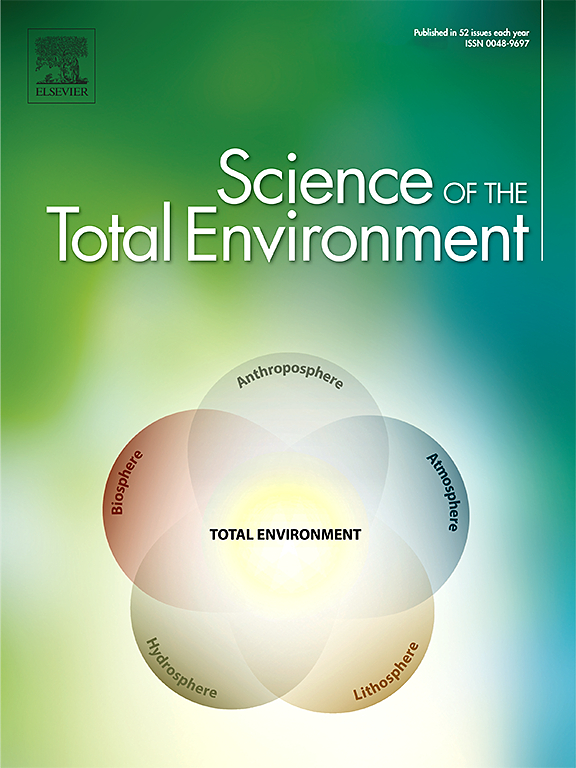Implementing a life cycle assessment (LCA) to evaluate organic farming weed control and fertilizers environmental implications
IF 8
1区 环境科学与生态学
Q1 ENVIRONMENTAL SCIENCES
引用次数: 0
Abstract
Organic farming is expanding globally in response to the growing need for more sustainable food production. However, assessing both direct and indirect environmental effects is essential for identifying effective practices. This paper employs a Life Cycle Assessment (LCA) using a cradle-to-farm gate framework to evaluate the environmental effects of non-chemical weed control methods (row-cultivator, finger-weeding, flaming, and hand-weeding) in combination with four fertilization treatments (compost at 10, 30, and 60 m3 ha−1, and chemical fertilizer) in the production of four organic field crops grown under irrigated conditions in a Mediterranean climate. The analysis shows that producing 1 kg of crop results in emissions of 0.5–1.6 kg CO2 eq., 0.002–0.009 kg SO2, and energy use of 9–37 MJ. Over 95 % of these impacts are driven by irrigation, fertilizers, and weed and pest management. Significant differences between treatments underscore the role of crop-specific farming practices. Finger-weeding consistently lowered environmental impact across most conditions, whereas cultivation and flaming generally resulted in moderate to high impacts regardless of fertilizer level. Hand-weeding had the lowest environmental impact but was the most labor-intensive approach. The untreated control consistently led to the highest environmental burdens, reinforcing the necessity of effective weed management. By identifying key environmental hotspots, this study provides a foundation for optimizing weed control and fertilization strategies, integrating best farming practices, and informing policies to improve the sustainability and resilience of organic cropping systems in Mediterranean agriculture.

实施生命周期评估(LCA)来评估有机农业杂草控制和肥料对环境的影响
有机农业正在全球范围内扩张,以应对日益增长的对更可持续的粮食生产的需求。然而,评估直接和间接的环境影响对于确定有效的做法至关重要。本文采用生命周期评估(LCA),利用从摇篮到农场的框架来评估非化学除草方法(行耕、手指除草、火焰除草和手除草)与四种施肥处理(10、30和60 m3 ha - 1的堆肥和化肥)在地中海气候灌溉条件下种植的四种有机大田作物的环境影响。分析表明,每生产1公斤农作物,二氧化碳当量排放量为0.5-1.6公斤,二氧化硫排放量为0.002-0.009公斤,能耗为9-37兆焦耳。其中95%以上的影响是由灌溉、化肥、杂草和病虫害管理造成的。处理方法之间的显著差异强调了特定作物耕作方法的作用。在大多数情况下,手指除草都能降低对环境的影响,而耕种和焚烧通常会产生中等到高度的影响,无论肥料水平如何。手工除草对环境的影响最小,但却是最劳动密集型的方法。未经处理的杂草控制始终导致最高的环境负担,加强了有效杂草管理的必要性。通过识别关键的环境热点,本研究为优化杂草控制和施肥策略,整合最佳耕作实践,并为提高地中海农业有机种植系统的可持续性和弹性提供政策信息提供基础。
本文章由计算机程序翻译,如有差异,请以英文原文为准。
求助全文
约1分钟内获得全文
求助全文
来源期刊

Science of the Total Environment
环境科学-环境科学
CiteScore
17.60
自引率
10.20%
发文量
8726
审稿时长
2.4 months
期刊介绍:
The Science of the Total Environment is an international journal dedicated to scientific research on the environment and its interaction with humanity. It covers a wide range of disciplines and seeks to publish innovative, hypothesis-driven, and impactful research that explores the entire environment, including the atmosphere, lithosphere, hydrosphere, biosphere, and anthroposphere.
The journal's updated Aims & Scope emphasizes the importance of interdisciplinary environmental research with broad impact. Priority is given to studies that advance fundamental understanding and explore the interconnectedness of multiple environmental spheres. Field studies are preferred, while laboratory experiments must demonstrate significant methodological advancements or mechanistic insights with direct relevance to the environment.
 求助内容:
求助内容: 应助结果提醒方式:
应助结果提醒方式:


